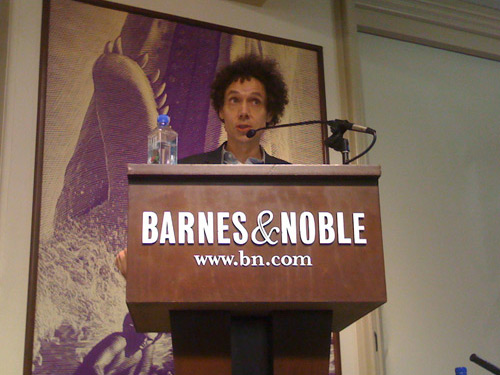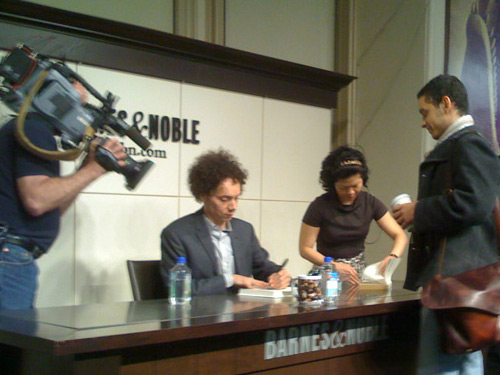I attended an event for the author Malcolm Gladwell, where he gave a chat and did a book signing. I found the entire experience fascinating.

I arrived nearly 2 hours early to get a good seat up front, and I was not alone. He spoke about his new book, Outliers, and some of the secrets to success. He’s an engaging storyteller, even if his data is sometimes questionable.

After his stories, audience members were allowed to ask questions, and this was really interesting to me. We were given permission to ask a set number of questions – to have direct access to the author.
For in-person events, this is considered a rare opportunity. But online, this is common, and to a degree, expected.
In responding to a particular publication or writer, you can “comment” on a story; email writers directly; publish a reaction on your own blog; or publish a reaction on a social network, such as YouTube. These ideas were once revolutionary, segmented to the “letters to the editor” page or rare in-person events like this. Now, it is simply assumed. What has happened is that communication structures have changed, and to a surprising degree, power has shifted.

I had my book signed after the event, but wasn’t sure why. I don’t place any value on signatures, but felt obligated since I was there, partaking in this “rare” opportunity. After I got my book signed, I sat back and watched others do the same. What is it that drives us to wait in line and have a journalist – an author – touch their book? To mark it with ink? What meaning does this have for us? Is it simply the “collector” nature we have in this country, or is it something deeper? Does this bring us closer to the ideas that inspired us in this book?

Taking a step even further back, to take in this crowd that gathered, in this enormous Barnes & Noble in Union Square, what is all this? A public square? A place to pay homage to books – to history – to community? Who knows. But here are some things I do know…
You are seeing the space between journalists, authors and their audiences shrink. We are now part of the same crowd, each empowered to take turns on the stage, or to do away with the stage completely.
And yet, this does not diminish the value of journalists, of writers, of thought-leaders, or of innovators.
Our underlying values haven’t changed, but the way we interact has. We gather, in person and online, to share, to find inspiration, to spread our wings, to come together, to pull apart, to learn, to escape, to journey and to find.
Media is changing. Magazines and publishing are changing. Journalism is changing. Communication is changing. Our culture is changing. And yet, wherever you go, there you are.
None of these things should instill fear. The creation of one element does not require the destruction of another. We are simply finding new ways to do the same things that have always mattered to us.
For all the changes, people like me still buy Malcolm’s book, still show up two hours early to see him speak, and still read the NY Times review of his book with far greater interest than we would a review on a social network.
In the end, what I like most about new media, is how it empowers us to do more TOGETHER, than alone.
And for that, I am thankful.
